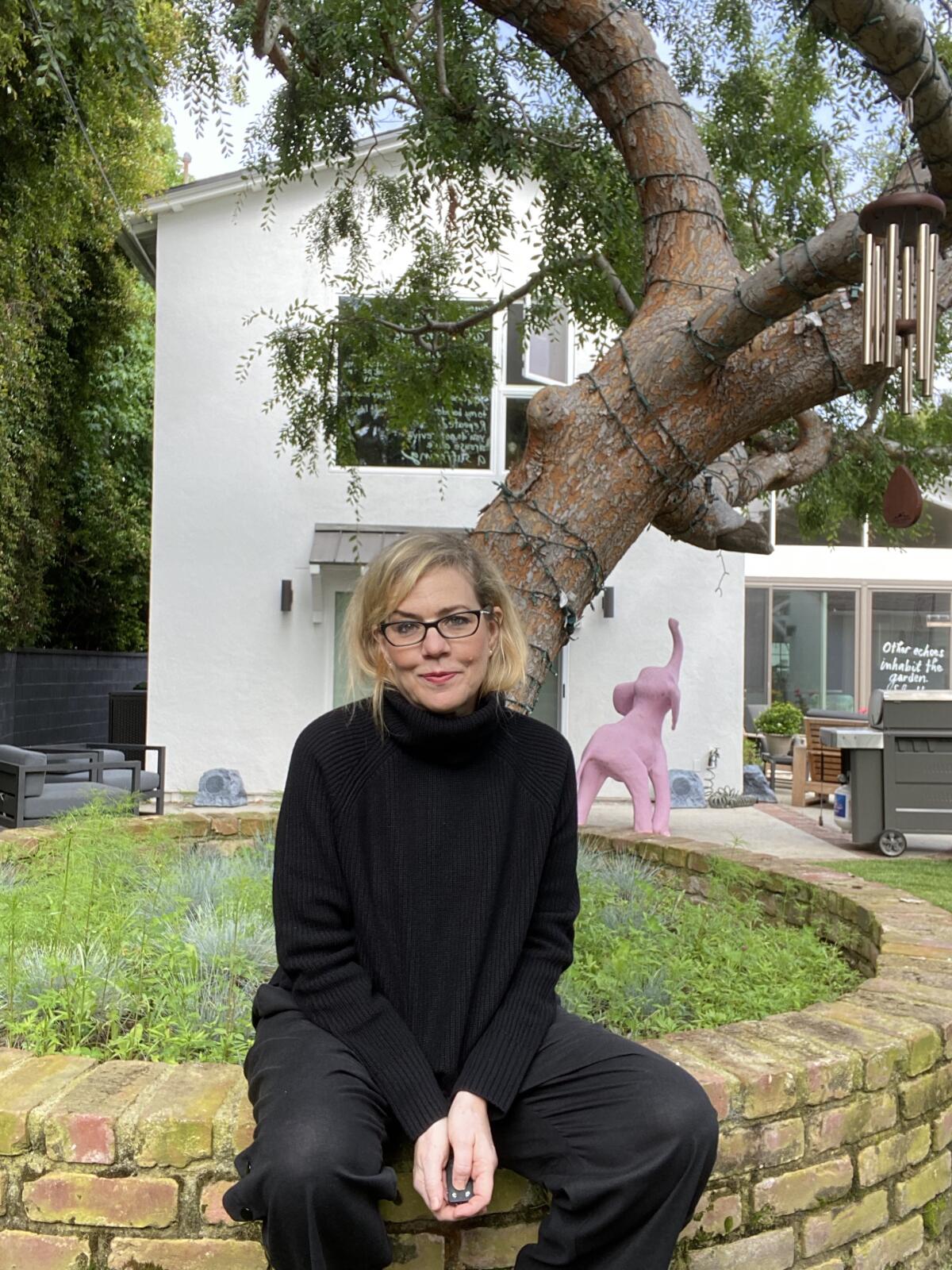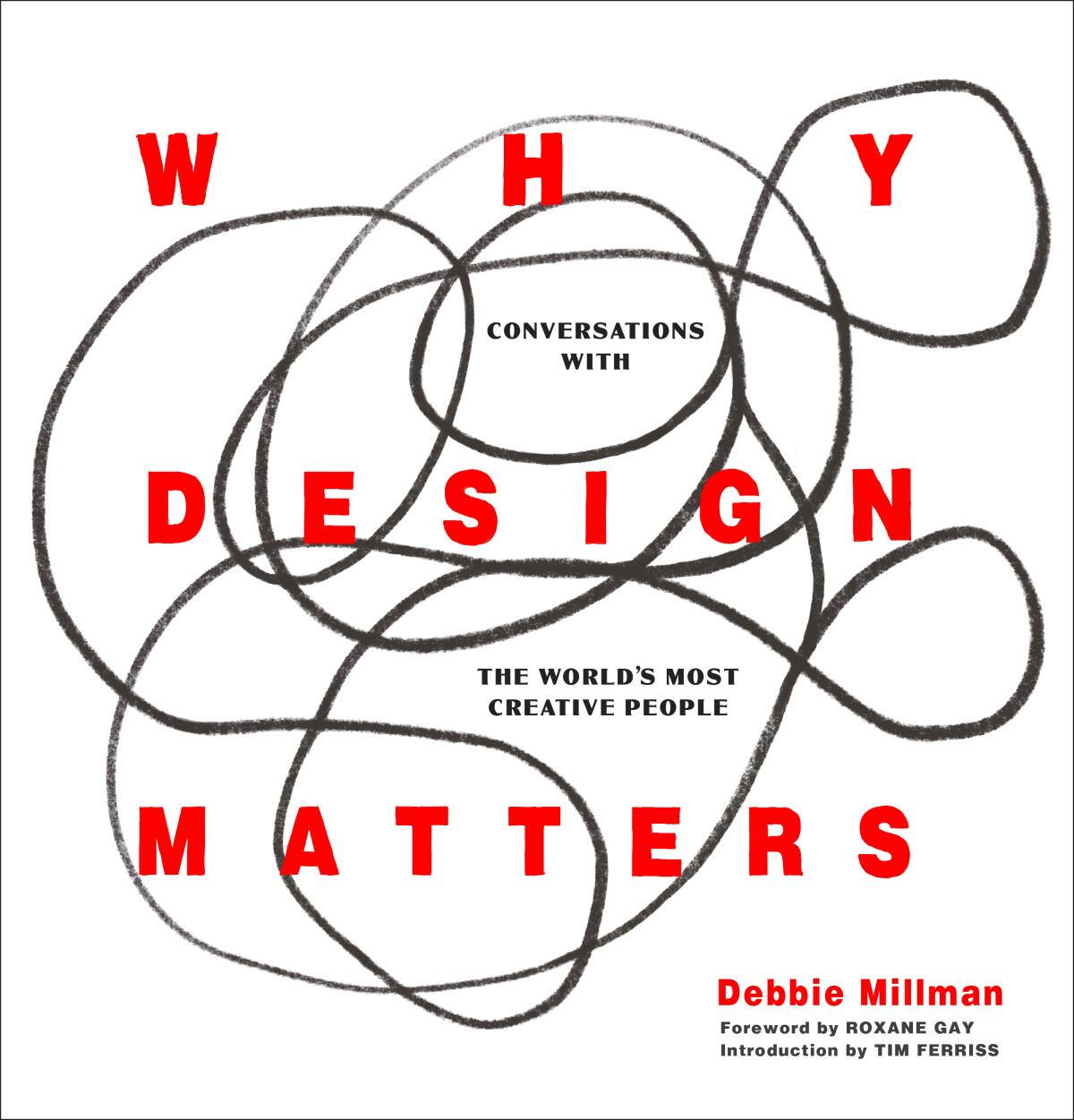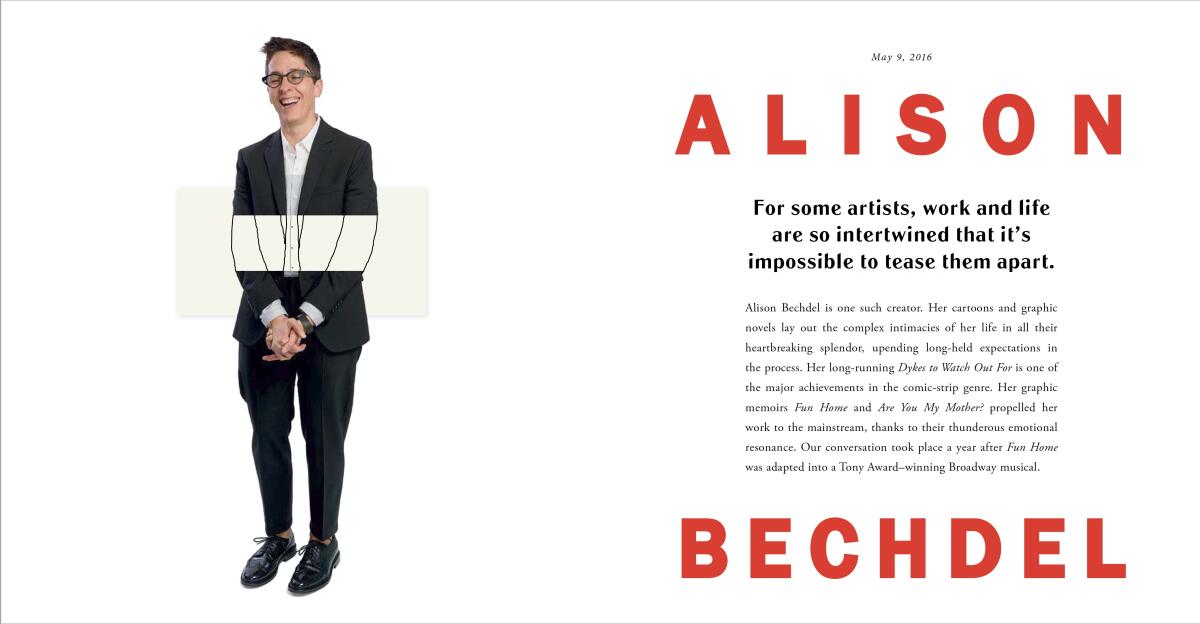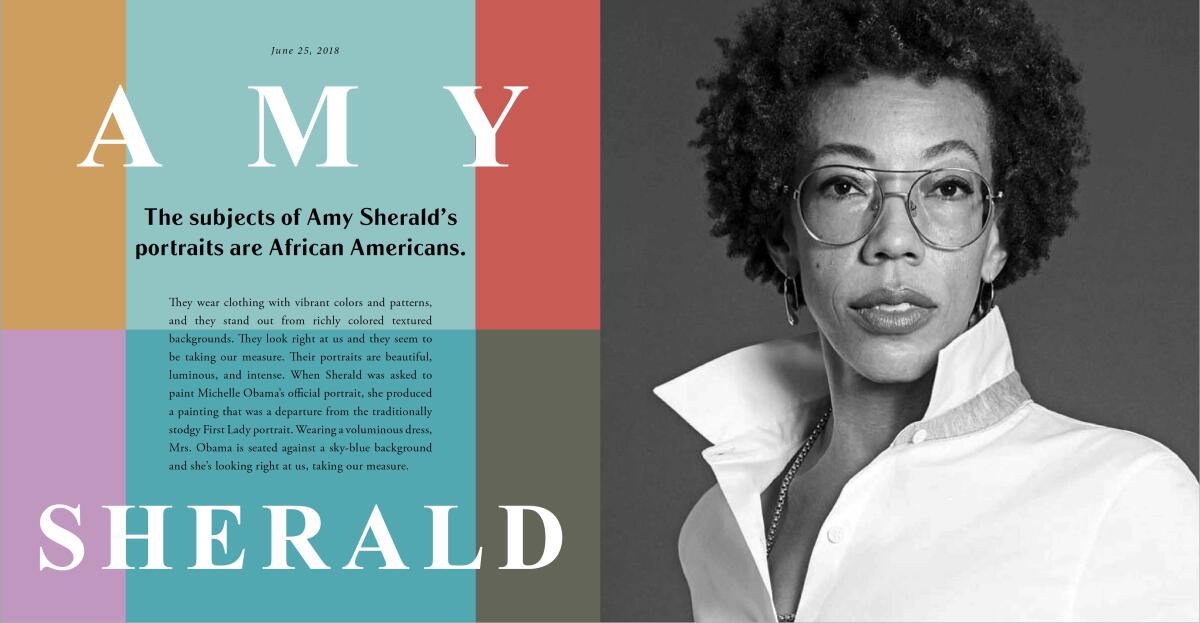How a brand consultant-turned-designer-podcaster became the antidote to Joe Rogan

On the Shelf
Why Design Matters: Conversations with the World's Most Creative People
By Debbie Millman
Harper: 368 pages, $60
If you buy books linked on our site, The Times may earn a commission from Bookshop.org, whose fees support independent bookstores.
I’m nestled into a buttery leather couch in the sun-drenched, art-filled L.A. home office of Debbie Millman, creator of the long-running podcast “Design Matters” and the new book, “Why Design Matters: Conversations With the World’s Most Creative People.” Joining us on the couch, if not in our fascinating conversation, is Max, her meltingly cute maltipoo, a recent gift from her wife, Roxane Gay.
In the opening pages of her book, Millman writes about having been “one of the few women in the U.S. running a global brand consultancy,” then quitting her job. “I had achieved a great deal, but there was an echoing vacuum of meaning and purpose in my life … I began to wonder if I had lost my creative soul, or at least abandoned it to my professional ambition.” Then came an offer from VoiceAmerica to host a podcast about design — a guaranteed yawn, Millman thought, unless she could bring the concept to life. Which she proceeded to do. “I have spent 16 years consumed by the question of how to conduct a good interview, how to get interesting people to reveal the depths of who they are.”

The podcast isn’t her only gig. Millman is also (take a breath): chair of the branding department at New York’s School of Visual Arts, editorial director of Print magazine, a curator, speaker, designer, artist and the author of six books. I ask Millman if there’s an organizing principle to it all.
“I’m happiest when I’m making things,” she answers. “It could be a lesson plan, a podcast, an illustration, a friendship, a silly pom-pom table. I like imagining nothings into somethings.”
In front of us sits the aforementioned table, a wooden crate found on the street, painted black and embellished with multicolored pom-poms. Millman also shows me a pair of festively labeled “Pride Candles.” “I was asked to make these for the brand Wax Cabin. I’ve also created notebooks, playing cards, wrapping paper...”
“Dining room tables?” I joke (or so I think).
“If someone asked me to build a dining room table,” Millman answers, “I would.”
“Anonymous Sex” brings stories from Téa Obreht, Louise Erdrich, Mary-Louise Parker and more. Contributors on why you’ll have to guess who wrote what.
Full disclosure: I’m no design geek. I covet a beautifully designed home, haircut or website as much as the average Jill. Nonetheless, Millman’s new coffee-table book, which consists of 55 excerpts from the 500 podcast interviews she’s conducted over the last 16 years, appeals to me, and might appeal to you, because it’s more about what matters than it is about design.
“There’s brand equity in its name,” Millman says. “As a brander, I know better than to take the word ‘design’ out of it. So I tried to make sense of the name instead, by broadening the word to mean ‘creating our lives intentionally.’ You can apply that to everything: relationships, wardrobe, parenting, how you choose to live.”
It’s an interesting flex, perhaps more consistent with branding than reality, but the resulting book is the real deal. Coffee-table-sized, it’s flawlessly rendered: Each spread piques the adventurous curiosity the book advocates, with striking contributor head shots, pops of red ink against pleasingly eccentric type treatments and random squiggles drawn by Millman’s hand. The interview subjects are divided into “Legends,” “Truth Tellers,” “Culture Makers,” “Trendsetters” and “Visionaries.”

Like the eclectic art in her home, “Why Design Matters” benefits from the famously happy Millman/Gay union. Gay wrote the foreword, excerpted on the book’s back cover: “A gloriously interesting and ongoing conversation about what it means to live well, overcome trauma, face rejection, learn to love and be loved, and thrive both personally and professionally.”
Gay is far from the only household name in the book — depending on your household. Among the “Legends” is “Fun Home” graphic novelist Alison Bechdel: “Becoming a lesbian cartoonist was almost like seeking a form of expression that no one was going to notice or judge.” And Anne Lamott: “On down days, I can believe what I secretly think about myself or I can believe how my friends see me, which is as a magical, brilliant, tenderhearted person.” And the poet Elizabeth Alexander, on watching her husband’s soul leave his body: “His heart burst, so he died before he hit the ground. What I can tell you, even knowing that, is that when he was in our home, he was there, he was really in there. And then later, the same body, still warm — he simply wasn’t.”
Alison Bechdel talks about her ‘fitness memoir,’ ‘The Secret to Superhuman Strength,’ the first book in 9 years from the pioneering graphic memoirist.
In podcasting, a field whose most successful practitioner allows fringe cranks to ramble for hours about conspiracy theories, it’s refreshing to see a distillation of revelations from people you’d actually want to listen to at length, especially when they come bearing surprises. Everyone’s favorite therapist, Esther Perel, calls polyamory “just a natural progression.” Amy Sherald describes the psychic weight of painting Michelle Obama’s official portrait. Author Malcolm Gladwell, under Millman’s questioning, argues that focusing on whether individual cops are racist is “a way of shutting down discussion” and side-stepping structural racism. It’s a controversial take from an author who’s caught a lot of flak for controversial takes, but Millman gives Gladwell room to make his case.

Others share personal struggles and explain how they overcame them. Memoirist Chanel Miller, whose Stanford sexual assailant received a shockingly brief jail sentence, says the hate mail she got after revealing her name “strengthened my resolve to be all right.” In the book’s final interview, Eve Ensler, of “Vagina Monologues” fame (now known only as V), discusses the uterine cancer that almost killed her. Before her diagnosis, “I had this passive resignation about my body. I didn’t fight for my body. It wasn’t until I got sick that that changed, that I came into this body. … The greatest joy is living in that vulnerability.”
Sprinkled among the big names is advice from those I’ve never heard of but now want to hear more from, including ad guru Cindy Gallop, founder of the website “Make Love Not Porn,” who offers: “You will never live the life you really want to live if you care what other people think. Know who you are. Know what you want to do. Live accordingly.”
In yet another ‘sorry not sorry’ CEO email, Spotify’s Daniel Ek claims to regret the damage done by Rogan’s anti-vax stance and offensive language
As my time in Max and Debbie Millman’s beautiful room comes to a close, before Millman escorts me past an office where her wife is Zooming into a writers room, I ask what she hopes “Why Design Matters” will accomplish.
“World domination!” she says, flashing a smile. Then, “I hope it helps people be less afraid of taking risks, trying something new. Every single one of the 500 people I’ve interviewed for the podcast expressed some insecurity or trepidation about what they do. By sharing how some of the world’s most creative people have overcome obstacles — made it through depression and failure and all kinds of other hardships, but kept trying — I hope to make people feel OK about admitting to those things.”
Having learned, it seems, that any great interview involves vulnerability on both sides, Millman shares her own. “Failure is my story too,” she says. “My goal was never to be a brander. I wanted to be a fine artist. A writer. A performer on Broadway.” Before becoming a consultant, “I was rejected by every profession I tried, from Columbia School of Journalism to the independent study program at the Whitney Museum. I had fantasies of how I was going to live my life, none of which panned out. And I had very little confidence, so every time I got rejected, I dropped that idea.
“Now I think that if I’d wanted those careers the way I wanted the ones that did happen, they would have happened too.”
Maran is the author of “The New Old Me” and a dozen other books. She lives in Silver Lake.
‘Bad Feminist’ and ‘Hunger’ author Roxane Gay will use the instructional lecture format to teach writing with a bent toward justice and social change.
More to Read
Sign up for our Book Club newsletter
Get the latest news, events and more from the Los Angeles Times Book Club, and help us get L.A. reading and talking.
You may occasionally receive promotional content from the Los Angeles Times.









